
Interview “Our big opportunity is the dialogue with our customers”
Side by side with the President, they shape the strategy of the German Patent and Trade Mark Office: Vice-President Dr Maria Skottke-Klein and Vice-President Bernd Maile on new exchange formats with industry, challenges in digitisation and staff recruitment — and good teamwork in senior management
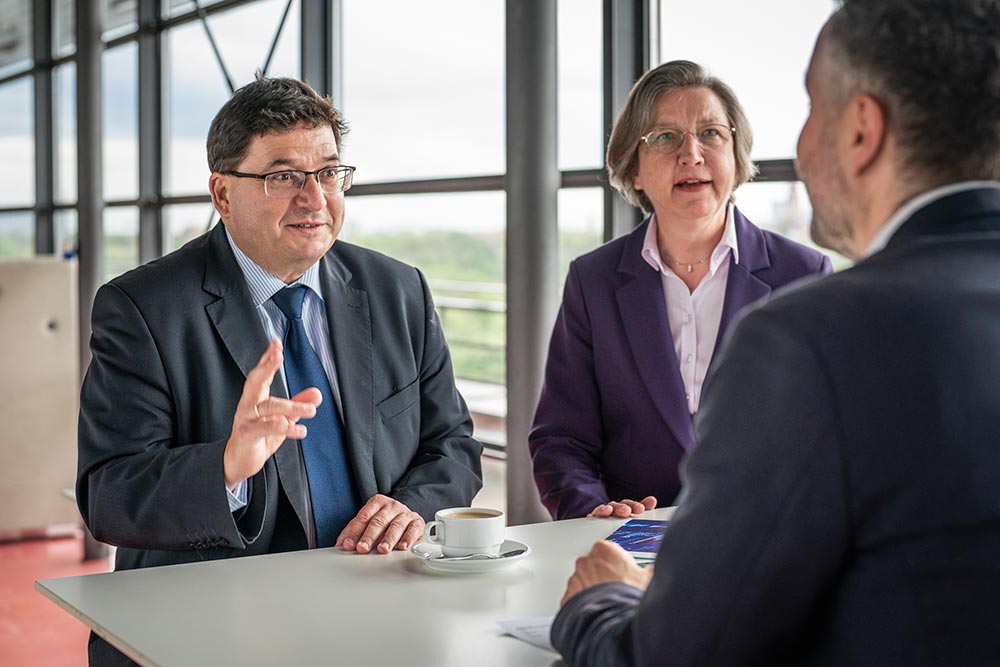
Bernd Maile has been Vice-President of the DPMA since 1 June 2021. After studying physics at the Eberhard Karls University in Tübingen and at the University of Stuttgart, he worked for several years as a development engineer, project manager and head of a manufacturing division at several German and US companies in the telecommunications and semiconductor industries. In 2000, he joined the DPMA and worked as a patent examiner for seven years. This was followed by seven years as a judge at the Federal Patent Court until he returned to the DPMA in 2013 as Head of Division and later Head of Directorate General 1 (Patents and Utility Models).
Dr Maria Skottke-Klein has been Vice-President of the DPMA since 1 December 2023. She joined the DPMA in 1991. Initially, she worked as a patent examiner, later as Head of Division, Head of Division Group and Head of Directorate General 2 (Information). Before being appointed Vice Presindetn, she headed Directorate General 1 (Patents and Utility Models) for one year. Skottke-Klein studied chemistry at the Ludwig Maximilian University in Munich and completed her doctorate at the Fritz Haber Institute of the Max Planck Society in Berlin.
Dr Skottke-Klein, Mr Maile, the role of a Vice-President is difficult for outsiders to grasp: Deputy? Representative? Second among equals? How do you perceive your role at the DPMA?
Dr Maria Skottke-Klein: It really is a special position. On days when the President is in the office, you are number two. You endeavour to do what she needs so that she can run the office. On days when she is not in the office, you have overall responsibility and you fulfil it. Nevertheless, there are also agreed routines for these cases. Of course, if there are issues on which the President wishes to be consulted, we will of course try to contact her — wherever she may be.
Bernd Maile: And of course the three of us are also a leading team. It is very important to us that we exchange ideas frequently. In our daily meeting, we discuss important issues that need to be addressed and inform the President from our respective areas of responsibility. We often have a certain filter function. The trick is to separate what needs to be decided ourselves and what — prepared as comprehensively as possible — needs to be passed on to the President for a decision.
How do you divide up the tasks in the team?
Maile: Dr Skottke-Klein is responsible for Directorates General 1 (Patents and Utility Models) and 2 (Information), and I am responsible for Directorates General 3 (Trade Marks and Designs) and 4 (Administration and Law). But of course, there are many interdisciplinary issues and almost everything is interconnected. It is therefore extremely important to keep the information flowing between us. We do this as best we can.
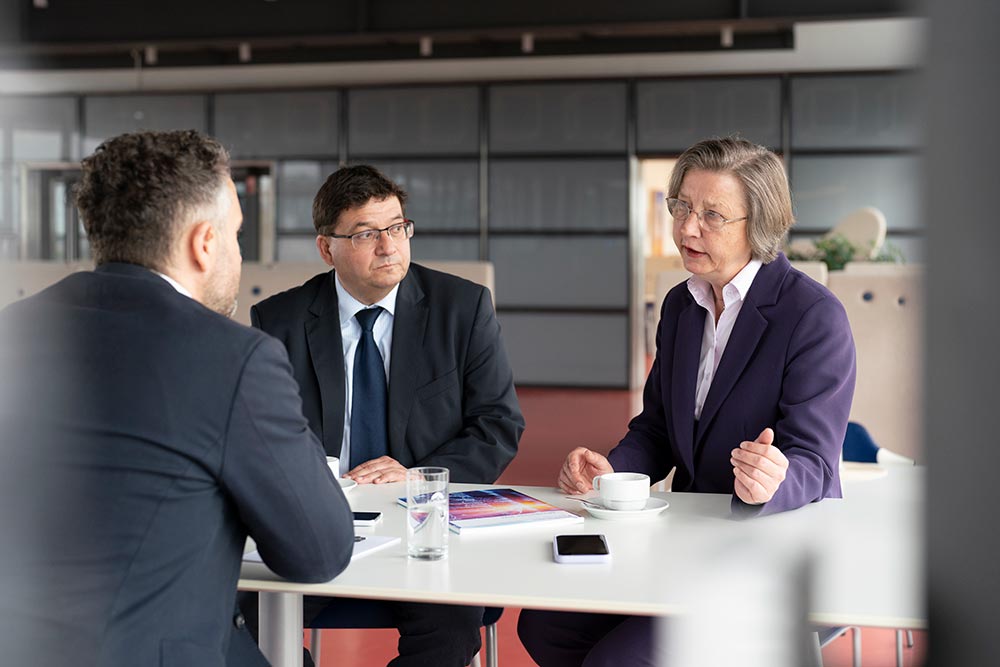
“The most important strategic challenge is the quality of our services.”
In your roles as Vice-Presidents, compared to your previous leading positions, you now play an even greater role in determining the strategic direction of the DPMA. What strategic challenges do you currently see?
Dr Skottke-Klein: In my view, the most important strategic challenge is the quality of our services, especially in IP procedures. In this regard, we also see ourselves in fruitful competition with the European IP authorities. After all, you can also obtain protection for Germany with a European patent, a European trade mark or a European design. In contrast to our European partners, we can only offer national protection — a competitive disadvantage that we can only compensate for if we score highly in terms of quality. Digitisation is also an important strategic issue. We have already made great progress with our electronic IP files and digital workflows. We are also already using artificial intelligence in some areas — for example, when searching and classifying applications. However, we still see a lot of potential for development. In the medium term, we are therefore planning to invest in further AI support for the work of our staff.
Maile: I would agree with that. I think we are on the right track. We have recently done a lot to be able to offer formally standardised first office actions in patent examination. And we have significantly optimised our search tools. We have set an important course here. And we are in intensive dialogue with the industry …
… where there currently is a lot of discussion on the topic of patent quality.
Maile: Yes. The debate has picked up speed over the past year. After all, patent quality is of crucial importance to companies. Only legally valid patents secure investments and create competitive advantages. We receive very positive feedback from our applicants. This motivates us, but it does not mean that we cannot get even better. We are working on this, and this is also a very important strategic issue, in very close dialogue with our users.
What does the DPMA have to offer in terms of dialogue?
Dr Skottke-Klein: We see dialogue as a great opportunity — for us and our customers. At our annual DPMAnutzerforum meeting, we engage in dialogue with the entire range of our users — using lectures, panel discussions, chats and workshops. For some years now, we have also had the User Advisory Council on Patents/Utility Models, in which the user groups for these IP rights are represented. The User Advisory Council has developed excellently and has become a central and indispensable advisory committee. We will also establish a similar committee for trade marks and designs. In order to be even closer to the pulse of the economy, we also established DPMAimpuls, a new dialogue format, last year.
What is DPMAimpuls and what do you want to achieve with it?
Dr Skottke-Klein: DPMAimpuls is an annual meeting with representatives of leading companies in Germany — i.e. large-scale industry — and some medium-sized companies with a high filing volume. Of course, the Chamber of Patent Attorneys and the university sector are also invited. Based on what I consider to be a very fruitful discussion at the first plenary session last year, specific working groups on very topical issues were soon formed. For example, on the topic of software patenting. In a workshop, experts from the companies and our examiners worked on a common understanding of how patent claims for such inventions can be formulated in such a way that they are technical and therefore patentable. Another example: For decades, the chemical industry has been filing its inventions predominantly in Europe. Recently, however, we have realised that national patent applications are no longer completely outside the IP strategy of some companies. We are now discussing what the DPMA can do to become more attractive for the chemical industry and to receive more applications from this sector.
“We see considerable economic potential in sensitising SMEs."
What is the DPMA doing for small and medium-sized enterprises (SMEs)?
Dr Skottke-Klein: SMEs play a very vital role for us. For two years, we have had an explicit legal mandate to sensitise the general public and SMEs in particular to the opportunities and enforcement of IP rights. In a survey conducted for us by a major research institute, only four out of ten SME representatives stated that they had knowledge of IP rights. And we know from studies that only around ten per cent of SMEs in Europe have IP rights. Conversely, it has been proven that those SMEs that protect their intellectual property generate considerably more turnover than those that do not. We therefore see considerable economic potential in this context. Among other things, we help SMEs to access EU funding, for example as part of the SME Fund. The DPMA is the “contact office” for the implementation of this funding programme for innovation and arranges so-called “IP audits”, which give SMEs an overview of their individual options.
Mr Maile, what strategic topics are there in Directorate General 3?
Maile: One of the fundamental challenges in the trade mark and design sector is that we are also competing in Europe. Our objective must be to offer high-quality national procedures. And the trade mark registration procedures, but also the other types of procedure — special motion procedures, opposition or cancellation proceedings — must of course be completed reliably within a reasonable period of time. Everything is based on precisely defined, transparent in-house processes. And of course — or above all — well-trained staff. We therefore attach great importance to training in all areas of IP rights, especially in the field of trade marks. However, good training takes time. A certain lead time is required before we have qualified a first examiner in the trade mark area. We are usually talking about a period of three years. The same applies to legal examinations in Directorate General 3, which means that if there is an acute need for personnel, we cannot change the situation overnight. If the process of recruitment, qualification and work in the field of IP rights comes to a standstill because nobody can be recruited or has been recruited for years, this will be problematic in terms of quality and duration of procedures for all national procedures offered.
You mean because of the current difficult budgetary situation?
Maile: That is right. We are preparing ourselves for the fact that we will not be able to hire as much as we think is necessary in the next two years. Of course, we understand this necessity and are facing up to the situation. But one thing is clear: the budgetary situation is a major challenge — and not just in terms of personnel. We will do everything we can to maintain and, if possible, improve our quality. At the same time, we ask for your understanding if not every project can be realised as quickly as we would wish in the near future.
“We have a very good offer in terms of work-life balance."
Even with a good budgetary situation and sufficient posts, the DPMA as a technical office is in competition with the largest national and international high-tech companies when it comes to recruiting staff. What speaks in favour of the DPMA?
Dr Skottke-Klein: I receive answers to this question time and again from applicants for the position of patent examiner in job interviews. People who have worked in industry often work on projects that are characterised by a great deal of pressure, travelling and heteronomy. After a few years, many long for a job where they can work more independently. Where they are not driven by deadlines set by others and have enough time left to delve deeper into technical matters. This predictable, regulated, self-determined work is of such high importance to many people that they are willing to accept a drop in remuneration compared to their previous job in industry.
Maile: That is also what I hear. In addition, of course, we have a very good offer in terms of work-life balance. Partly due to our high degree of digitisation, we offer excellent flexibility in terms of location. Colleagues generally only have to come into the office one day a week. In Munich in particular, this is very attractive because you can then afford not to live in the expensive city, but to move to attractive cheaper locations. The loss of remuneration is then comparatively less serious.
Can you tell us about flexibility in working hours?
Maile: We also offer the greatest possible freedom of choice. Many colleagues often do not want to work full-time due to family circumstances and are looking for part-time models that are very individually tailored to them so that they can plan their lives well. We make this possible wherever it is compatible with the tasks to be performed. And there are no disadvantages in terms of career options. Leading positions are also available as part-time jobs. Incidentally, flexibility also applies in the other direction: if the family situation eases, we can usually increase the number of working hours again without any problems. This model of flexible working hours is well received by our staff.
Dr Skottke-Klein: What I am particularly pleased about is that this is also leading to more and more men taking the opportunity to work part-time or take parental leave for longer than just one month. I believe that these working conditions are a great benefit for all sides.

25 years ago 25 years in Jena: The DPMA celebrates — and expands
Jena. Around 110,000 inhabitants. Almost a fifth of them students. With universities and high-tech companies, a high-performance innovation ecosystem has been established: an ideal location for the German Patent and Trade Mark Office (DPMA). The Jena sub-office has been in existence for a quarter of a century and the DPMA continues to expand near the Saale river.
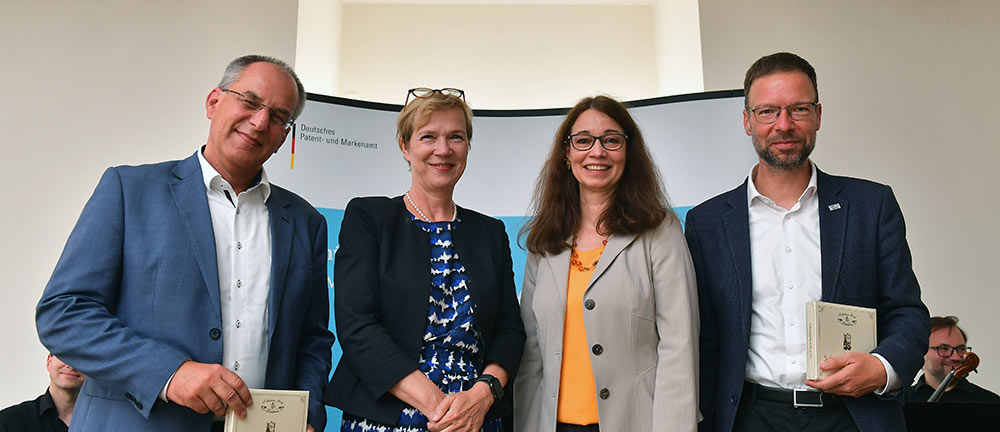
With the DPMA, a higher federal authority was established in Jena in 1992. This establishment had resulted from a decision made by the Federalism Commission (a commission composed of members of the federal legislative bodies Bundestag and Bundesrat). Until then, the DPMA had been represented at the headquarters in Munich and in Berlin. After the reunification of Germany, the German Patent Office and the Office for Inventions and Patents of the GDR were merged. Initially, the Berlin office was to be relocated to Jena, but then remained in place. Jena was added as a third location.
Since its opening on 1 September 1998, the Jena sub-office of the DPMA has become a constant fixture for the protection of innovation in Germany. It is a centre of excellence for IP protection throughout Germany.
The office is “a prime example of a successful partial relocation of a federal authority to another Land”, Dr Angelika Schlunck, State Secretary of the Federal Ministry of Justice, said at the anniversary ceremony in September 2023. “The cooperation between science and industry is exemplary. Jena is therefore one of the most dynamic cities in eastern Germany,” Schlunck emphasised.
Constant fixture in dynamic Jena
Utilising IP rights as valuable resources; providing impetus for industry, science, politics and society. The authority is optimally networked in the innovation city of Jena. A lively dialogue with Friedrich Schiller University, with innovation promotion in Thuringia and high-tech companies is part of this.
Jena plays a prominent role in the strategy of the German Patent and Trade Mark Office. The location has been successively expanded since 1998 — since the anniversary, there has been another location in Löbderstraße in addition to the rooms at the Goethe Galerie.
The colleagues in Jena are responsible for the entire design area of the DPMA. In addition, large parts of trade mark examination and the entire trade mark administration of the office are located at this location.
Since 2021, the DPMA has relocated parts of patent examination to Jena, where about 50 colleagues currently work in three patent divisions. This way, the three locations Jena, Berlin and Munich form a strong unity for IP protection.

Perspective Patent examiner at the cutting edge of technology — and a man “with family responsibilities”

"We consider our office a family-friendly employer and therefore also welcome applications from persons with family responsibilities". This is how our job advertisements read. But what exactly does such a sentence mean? Is it just a flowery recruiting phrase or is such a family-friendly work culture really practised at the DPMA? Patent examiner Moritz Kayser reports on his experiences in the daily routine of a part-time father.
I am a patent examiner in the booming technical field of electromobility. At the DPMA, technical trends are first and foremost on my desk and I experience first-hand the neck-and-neck race for innovations and their protection. Protection that I decide on every day, thus influencing technical topics of the future. I enjoy this exciting job, which also brings along great responsibility.
Plus, I belong to those persons having family responsibilities. More precisely, I am a man "with family responsibilities". It is a pity that I have to write this, but apparently there are not that many of this species — at least not of such working part-time. Traditionally, it is still predominantly women who are seen as the "persons with family responsibilities".
In fact, there are still far fewer men working part-time than women. At the DPMA, the figure has only been around 7.6 % for several years. Fewer men are also taking parental leave, and if so, it is often for no more than two months.
Personally, I'm surprised. Why shouldn't you take advantage of the opportunities offered to staff in the public sector in order to reconcile work and family life? And if you want to, it works out well — or even very well as is the case with the DPMA.
Parental leave — the ultimate soft skills seminar
I took longer parental leave myself and would not want to have missed this time with my children. Parental leave is a wonderful and unique experience. Or to put it another way: Do you want the ultimate soft skills seminar? Are you looking for new insights and exciting challenges that you could never have imagined before? Do you want to take your multitasking skills, negotiation skills and stress resistance to a new level? Take parental leave!
Planning parental leave with my superiors at the DPMA was no problem at all. Substitution arrangements were worked out unbureaucratically and nothing stood in the way of my parental leave. When I came back from my parental leave, my files were already waiting for me. There were no problems at all. During my absence, my colleagues had looked very well after my department and after a short period of familiarisation, it was as if I had never been away.
When I talk about my positive experiences with parental leave and the relaxed approach to it here at the DPMA, I often hear answers such as “I would have done that too, but …”. The “but” is often followed by fear of career setbacks, fear of losing touch or being side-lined professionally. It is a few years ago that I was employed in industry too, but I recall having had the feeling of “Yes, but …” very well myself. Taking parental leave? Working part-time? Well, you can do it, but …
Customised working time models for every situation
Here is another counter-example from the DPMA. Even after parental leave, I did not want to give up my time with the children and applied for part-time work during my patent examiner training. This was implemented quickly and without any problems. Plus, I was given advice on how to organise part-time work in the most sensible way and about which working time models were available. It is even possible to create completely individualised working time models for (almost) every situation.
My job as a patent examiner can generally be very well suited to the small and large imponderables you encounter in your life with family responsibilities. Even without parental leave and part-time work. Whether it is a paediatrician's appointment or a school trip, the unplanned closure of a kindergarten or a sick child — everything can be easily reconciled. There are not too many appointments and meetings, and there is no colleague in the department depending on my work progress. I work independently on my files — from the initial registration to the final decision — which means that I can organise my work myself. And not only the date, but also the location is flexible. I can organise whether I work at home or in the office largely as I wish. This is made possible thanks to digitised search and digital files. This also means that I myself am primarily responsible for the stringent processing of my files. Despite all flexibility, the work has to be done, of course.
And if one day, I absolutely have to go to the office and all childcare arrangements break down at the same time, I can book a parent-child office, where everything from a changing table to toys for different age groups is provided for. At internal events, there are at least as many attractions for children as there are for adults. Not to forget the crèche integrated into the main building. For a great number of my colleagues, having childcare so close to the workplace is an important part of their “work-life balance”.
DPMA also supports caregiving relatives
Well, as a “person with family responsibilities”, I have talked a lot about children. However, that is only one side of the story. Especially at workshops and events on the topic of “family and career” at the DPMA, it became clear time and again that it is not only about the children. For many “persons with family responsibilities”, following the children, the duties often continue, but then often with caring for their parents. I am sure that all the persons who care for or look after someone can also relate to the examples mentioned above. Flexibility and, above all, great support from superiors and colleagues are very important. A feeling of “We can do it” for (almost) every situation in life.
I have always been given this feeling. And with this feeling in mind, it is much easier to successfully reconcile work and family duties. Sometimes, after concentrated searching and abstract thoughts about a tricky application, there is nothing better than simply going outside and joining the kids in marvelling at squirrels or answering important questions such as “Which one is your favourite foot, by the way?”.
Finally, I have one more concern: I would like to direct a small appeal especially at men. Maybe you also want to become a “man with family responsibilities”. Take your time — preferably take parental leave — and give it a try! Take a few months alone with the children and give it a try! As already mentioned, no “soft skills seminar” can match what these exciting months have to offer.
At the DPMA, inviting “persons with family responsibilities” is not just an empty phrase — a family-friendly work culture is really practised at our office!
Do you want to make a career change or to further your career? If the answer is yes, the DPMA is the place. The DPMA is a modern employer offering interesting duties, great variety and secure prospects. Our exciting jobs cover many areas.
Further information is available on our career pages.

In Focus Initial consultation for inventors as an opportunity for your ideas
Do you want to protect an invention, a design or a trade mark, but do not know how? During initial consultations for inventors at the German Patent and Trade Mark Office in Munich and Berlin, patent attorneys provide free general information and personalised advice on how to proceed. Berlin-based patent attorney and initial consultant Dr Ulrich Dirks introduces the service and reports on how those seeking advice can gain new perspectives as a result.
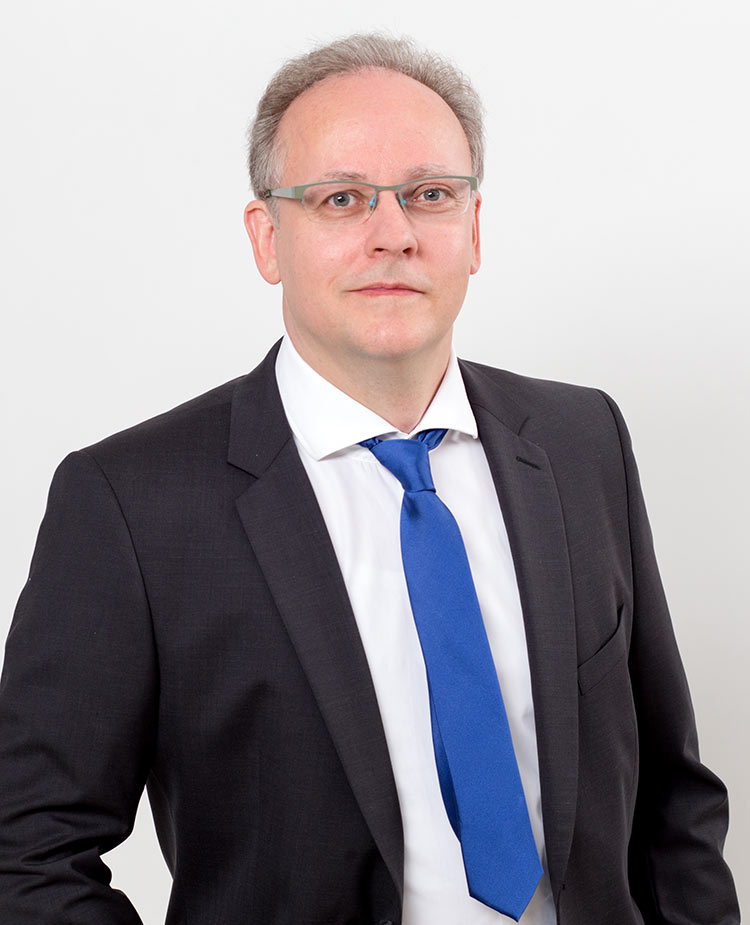
Mrs T. explained to me during the session of initial consultation for inventors that she had developed a game based on positioning and moving small wooden objects that could be used for therapeutic purposes, especially with older people. She enthusiastically showed the wooden game elements she had brought with her, which she had obviously designed very creatively herself. She had been advised by acquaintances to patent the game idea, or rather the rules of the game. How was she to proceed, as she was not at all familiar with such issues?
In 2023, as before, at the DPMA in Munich (main office building) and at the Information and Service Centre in Berlin (DPMA-IDZ), the above-mentioned initial consultation for inventors was provided in cooperation with patent attorneys. Within the context of this long-standing, highly popular format, patent attorneys provide free advice on basic questions on the protection of inventions as well as on other topics of IP protection on fixed days of the week. In short individual appointments, those seeking advice can receive legal explanations, strategic guidance and practical tips relating to their individual case, particularly with regard to filing, obtaining and enforcing patents, utility models, trade marks and designs.
On the one hand, due to the fact that some issues are not yet mapped to DPMA case types and owing to some legally complex issues or problems involving international aspects on the part of those seeking advice, but above all due to the legal advisory character, the initial consultation for inventors goes beyond what the Central Customer Care and Services of the DPMA can and may provide. On the other hand, it provides the possibility of receiving free basic advice aside from the legal services offered by patent law firms, which are — rightly or wrongly — perceived as having a higher threshold. Once the issues have been clarified, those seeking advice are typically put in a position in which they can decide for themselves what specific actions they should take at the DPMA, to what extent they should seek the help of a patent attorney in their case and what else they can do in favour of their IP situation. This is often accompanied by the correction of astonishingly erroneous prior opinions.
In 2023, solo self-employed persons, prospective business founders, university graduates, founders of start-ups and managers of small companies were again strongly represented in the rather mixed group of people who make use of initial consultation for inventors. In particular, it is regularly found that numerous independent inventors — who are themselves applicants for patents — have a considerable need for initial consultation. Furthermore, the voluntary commitment of the many patent attorneys involved helps to ensure that even low-income private individuals and start-up companies that are not yet profitable can obtain adequate access to IP rights.
Many of those involved see it as a particular advantage that the average of around 15 appointments per week (in Munich and Berlin combined), which require registration, are conducted in person rather than on screen. In 2023, as before, those seeking advice sometimes caused a surprise with design drafts, logo graphics or models and prototypes of their inventions they had brought with them.
The journey made in order to receive initial consultation for inventors was probably also worthwhile for Mrs T. She will probably not invest any time or money in preparing a patent application after she has been informed about the legal restrictions regarding the patentability of game rules and therapeutic methods and as no new technical solution for the material realisation of her game could be found during the conversation. However, she was grateful for my advice and wanted to consider filing a design application with the DPMA for her wooden game elements. Her questions about the relevant criteria, search options and any desired patent attorney services were answered with certainty. There was even enough time in the consultation to briefly inform her about copyright aspects and draw her attention to the topic of “trade marks” for a later marketing phase of her therapeutic game.
You can find further information on the initial consultations for inventors on our website.

In Focus Our LinkedIn channel
Fast, direct and unbureaucratic communication with our customers and partners is important to us. Our LinkedIn channel offers us an ideal platform for personal interaction and direct feedback. A lot has happened there since our first post two years ago.
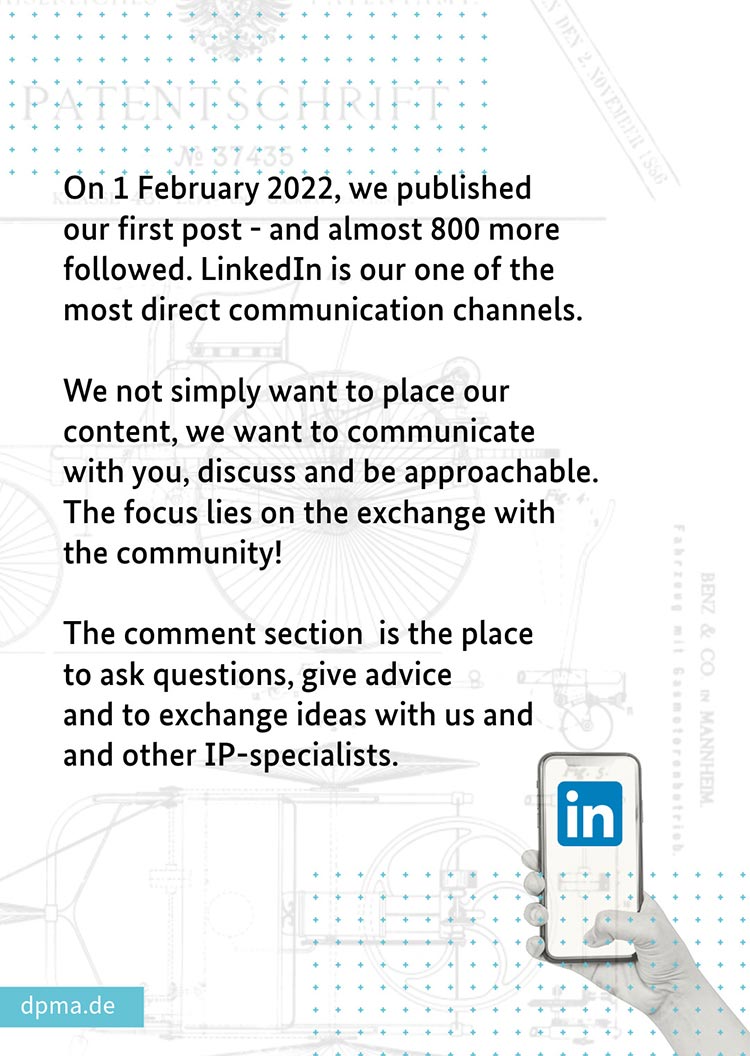
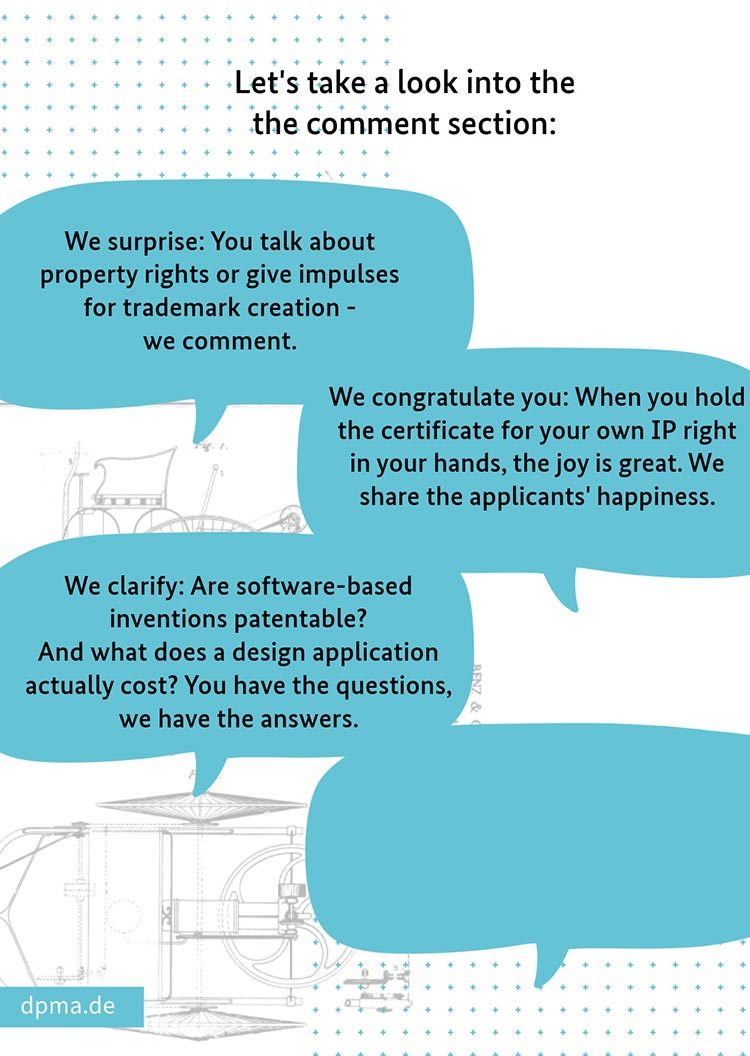
Our reach is growing every day — we started with 200 followers and now 10,000 people follow us. And we are part of a network: the patent information centres and international patent offices also provide information about IP rights and give an insight into their work. Together we stand for more IP awareness!
You are not following us on LinkedIn yet? Take a look at our channel and become part of our community, it's worth it! We look forward to meeting you and exchanging ideas with you!

At a glance Personnel and finances
The DPMA had a total of 2,793 staff at the end of 2023. (- 0.4% compared to 2022).
In 2023, 39.2% of management positions at the DPMA were held by women. The proportion of part-time employees in management positions was 15.6 %.
In 2023 we hired 99 new staff.
Incentive bonuses for 762 very committed and high-performing staff members were granted in the period from July 2022 to June 2023.

IT specialist

Media and information services clerk

Electrician for power and building services engineering

Management assistant in office communications

Carpenter

Administrative employee
A total of 30 trainees in 6 skilled occupations offered by the DPMA in Munich.
Further training
5.1 training days were used on average by staff for personal further training in 2023.
Income and expenditure
Breakdown of income by type of IP
Total expenditure1 DPMA €265.5m in 2023
1 Due to rounding, the sum of the rounded positions differs from the total expenditure shown in the income statement.
Career at the DPMA
Are you looking for a new career venture? Are you interested in a varied job with a wide range of development opportunities at the cutting edge of technology? At the same time, you would like to be able to balance work and personal life?
As a federal authority, we have a lot to offer to you — both as a central provider of IP services and as a family-friendly employer with flexible working hours.
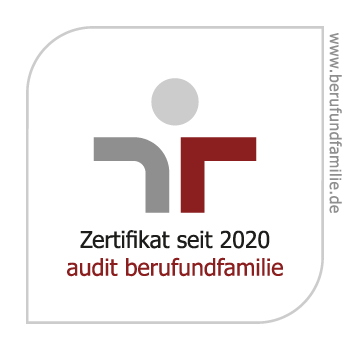
Information on job vacancies for the Jena location as well as on other interesting employment opportunities at the DPMA is available on our website under “Career”. Subscribe to our RSS feed so that you won’t miss out on any advertised job vacancies.